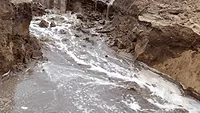Contaminated Ground Water Clean-up Ordered
The U.S. Air Force and Raytheon Co. have been ordered by the EPA to clean up a migrating plume of contaminated ground water at the Tucson International Airport Area Superfund Site, which has a 50-year history of chemical contamination due to its aircraft and electronics facilities and unlined landfills.
The U.S. Air Force and the Raytheon Co. have been ordered by the U.S. Environmental Protection Agency (EPA) to clean up a migrating plume of contaminated ground water at the Tucson International Airport Area Superfund Site. Under the order, Raytheon, formerly Hughes Aircraft, and the U.S. Air Force (USAF) are required to treat two solvents, trichloroethylene (TCE) and 1,4-dioxane (DX), in ground water coming from the 1,365-acre Air Force Plant 44 facility at the southern end of the Superfund site.
The extraction and treatment system at the Air Force Plant 44 is not effectively containing the contaminated ground water plume from the facility, allowing TCE and DX to migrate north and into a drinking water treatment plant operated by the city of Tucson. The treatment plant, located at the northern end of the plume, serves approximately 50,000 Tucson residents. The EPA’s order requires Raytheon and the USAF to install and operate an advanced oxidation process system to treat the solvents in the plume. Currently, the city-operated drinking water plant treats TCE, and is able to safely blend DX so that the water is safe to drink.
Sampling data from 2006 detected TCE in ground water as high as 3,400 parts per billion and DX up to 298 parts per billion. The company and the Air Force are required to treat contaminated ground water to below 5 parts per billion for TCE and 3 parts per billion for DX, and they face penalties of up to $32,500 per day, per violation if they fail to comply with the order.
The Tucson International Airport Area Superfund Site, listed in 1983, has a 50-year history of chemical contamination due to its aircraft and electronics facilities and unlined landfills. Raytheon used and disposed of metals, chlorinated solvents and other substances at the Air Force Plant 44 facility since 1951. The company used TCE in several degreasers and as a general-purpose solvent from the 1950s through the mid-1970s. As part of its operations, Raytheon used DX as a stabilizer to enhance the life of the solvent bath for degreasing manufactured parts. TCE, a volatile organic compound, is a non-flammable liquid widely used in the past as an industrial solvent, and both it and DX are considered probable human carcinogens.
The company collected waste solvents from the manufacturing area and disposed of them in drums, which then were put into uncontrolled landfills, and also discharged liquid solvent wastes into unlined drainage channels and pits at the facility. The waste solvents and other substances migrated from disposal areas into ground water.
The U.S. Air Force and the Raytheon Co. have been ordered by the U.S. Environmental Protection Agency (EPA) to clean up a migrating plume of contaminated ground water at the Tucson International Airport Area Superfund Site. Under the order, Raytheon, formerly Hughes Aircraft, and the U.S. Air Force (USAF) are required to treat two solvents, trichloroethylene (TCE) and 1,4-dioxane (DX), in ground water coming from the 1,365-acre Air Force Plant 44 facility at the southern end of the Superfund site.
The extraction and treatment system at the Air Force Plant 44 is not effectively containing the contaminated ground water plume from the facility, allowing TCE and DX to migrate north and into a drinking water treatment plant operated by the city of Tucson. The treatment plant, located at the northern end of the plume, serves approximately 50,000 Tucson residents. The EPA’s order requires Raytheon and the USAF to install and operate an advanced oxidation process system to treat the solvents in the plume. Currently, the city-operated drinking water plant treats TCE, and is able to safely blend DX so that the water is safe to drink.
Sampling data from 2006 detected TCE in ground water as high as 3,400 parts per billion and DX up to 298 parts per billion. The company and the Air Force are required to treat contaminated ground water to below 5 parts per billion for TCE and 3 parts per billion for DX, and they face penalties of up to $32,500 per day, per violation if they fail to comply with the order.
The Tucson International Airport Area Superfund Site, listed in 1983, has a 50-year history of chemical contamination due to its aircraft and electronics facilities and unlined landfills. Raytheon used and disposed of metals, chlorinated solvents and other substances at the Air Force Plant 44 facility since 1951. The company used TCE in several degreasers and as a general-purpose solvent from the 1950s through the mid-1970s. As part of its operations, Raytheon used DX as a stabilizer to enhance the life of the solvent bath for degreasing manufactured parts. TCE, a volatile organic compound, is a non-flammable liquid widely used in the past as an industrial solvent, and both it and DX are considered probable human carcinogens.
The company collected waste solvents from the manufacturing area and disposed of them in drums, which then were put into uncontrolled landfills, and also discharged liquid solvent wastes into unlined drainage channels and pits at the facility. The waste solvents and other substances migrated from disposal areas into ground water.
Looking for a reprint of this article?
From high-res PDFs to custom plaques, order your copy today!




